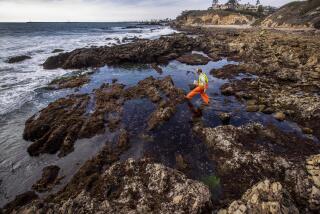Conferees OK Double-Hull Tankers : Environment: Most oil tankers serving U.S. ports will have to have the extra protection, if the measure is passed. The issue has been bitterly contested.
- Share via
WASHINGTON — House and Senate negotiators, ironing out differences over landmark legislation to clean up and prevent oil spills, agreed Thursday to require double hulls by the year 2010 on most large oil tankers serving U.S. ports.
The agreement, which clears the way for final action on the legislation later this month, resolved one of the most bitterly contested issues in a debate that assumed national prominence after a series of disastrous oil spills in U.S. waters over the last 15 months.
While a number of other issues have yet to be resolved, the controversy over double hulls was considered the most complex and contentious of the disputes standing in the way of final passage.
Neither the shipping industry, which sought to delay the double-hull requirement, nor environmentalists, who had hoped for more stringent requirements, are likely to be satisfied with the compromise.
The accord was accepted by the conferees assigned to reconcile the different versions of the oil spill legislation passed by the House and the Senate earlier this year.
“Mother Nature got a kiss on the cheek followed by a slap in the face today,” said Clifton Curtis, a lobbyist for Friends of the Earth, one of the environmental groups lobbying for the double-hull legislation. “We’re glad Congress has finally decided to mandate double hulls, but we’re deeply upset by the exemptions in the agreement and the unnecessarily long timetable for implementation.”
The Bush Administration, which had hoped to defer a decision on the need for double hulls until a National Science Foundation study is completed in January, also was unhappy with the compromise.
Even so, the President is not expected to veto the legislation as a result of the double-hull requirements.
“It’s not what we wanted but we think we can live with it,” said a Transportation Department official attending the session.
Under the compromise, all new oil tankers and barges larger than 5,000 gross tons must be equipped with double hulls. The provision, effective upon enactment, applies to all tankers, foreign or U.S.-owned, that transport oil or other hazardous material in U.S. waters.
Under a complex timetable, however, existing single-hulled tankers will have from five to 20 years either to be refitted with double hulls or to be retired.
The double-hull phase-in would begin in 1995, starting with the largest and oldest tankers, and be completed by the year 2015. Most vessels, including all large oil tankers such as the Exxon Valdez, would have to be retrofitted or retired by the year 2010.
The only exceptions would be vessels of less than 5,000 gross tons or those engaged in “lightering”--offshore loading and unloading activities. Vessels in these categories would have until 2015 to comply.
According to congressional estimates, more than 1,300 domestic and foreign-owned oil tankers currently serve U.S. ports. Only a small number of them--2% to 3%--have double hulls.
Hailing the accord as a balance between environmental and economic interests, conferees estimated that more than 40% of all tankers serving U.S. ports would be fitted with double hulls by the turn of the century--and all but 20% by 2005.
That represented a significant lengthening of the timetable contained in the original House-passed bill, which called for double hulls on all tankers, regardless of age or size, within 15 years. The Senate-passed version of the bill would have required double hulls only if the secretary of transportation decided, after further study, that they were necessary.
Environmentalists, calling double hulls the single most important measure Congress could enact to protect the nation’s waters from oil spills, objected to the longer timetable as unnecessarily long.
They also said that the exceptions it made for vessels under 5,000 gross tons in weight mean that inland waterways would not be protected from serious oil spills because most of the barges plying them would not have to comply with the double-hull requirement until 2015.
“The exemption for lightering vessels also means that the problem of oil spills won’t be solved so much as it will be transferred offshore,” said Michael Matz, a lobbyist for the Sierra Club.
Oil industry lobbyists, however, said that serious safety questions still hang over double hulls--a position supported by the U.S. Coast Guard, which favored a deferment of the double hull decision until after the National Science Foundation study is completed.
More to Read
Sign up for Essential California
The most important California stories and recommendations in your inbox every morning.
You may occasionally receive promotional content from the Los Angeles Times.










